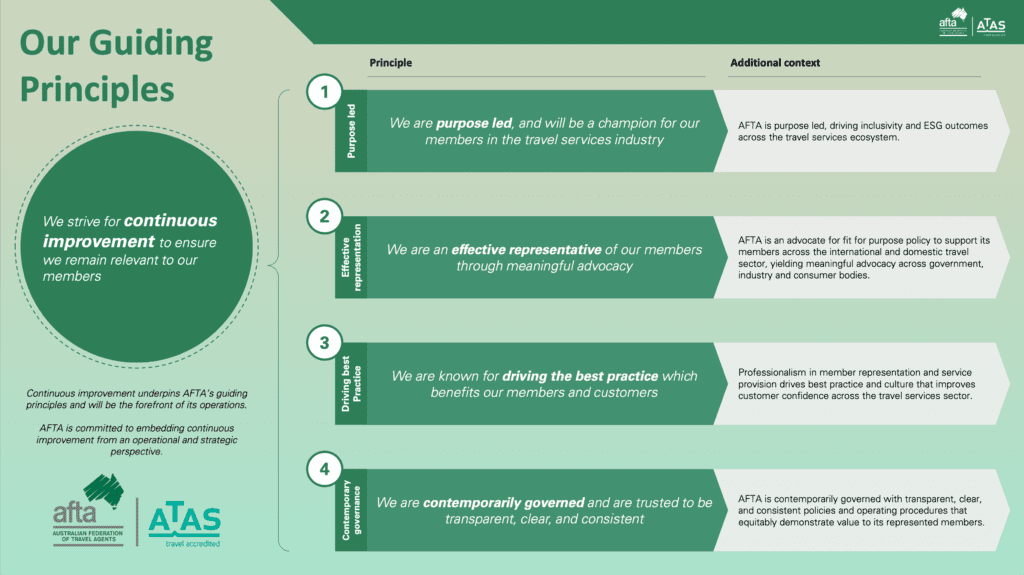The Australian Federation of Travel Agents (AFTA) has released a proposed update to its constitution. And it’s calling for travel industry feedback.
AFTA is calling on the travel industry to have its say on the proposal as part of AFTA’s efforts to represent its entire membership base better.
“We want as much feedback as possible into this document. Anybody who has a view of what AFTA needs to be will have an opportunity to have their say,” AFTA CEO Dean Long tells Karryon.
“We’re willing to go out with this document and take feedback, both positive and negative. Because if people are engaging, then we know people are invested in the future of AFTA as the travel industry’s peak body. That’s 100 per cent why we are putting it out in a draft form.”

Long says AFTA reduced the “consultative constitution” document from well over 60 pages to just 32 pages in what is essentially a “clean-up and modernisation” of the existing constitution.
The culmination of “18 months and hundreds of hours worth of time”, the proposed constitution allows for reform in four main areas within the AFTA framework.
What’s the point?
The first area relates to the overall purpose of the association. This includes outlining a set of objectives that “the existing constitution doesn’t have, which is a really important reform because it gives us a touchstone document from which to govern, and also to deliver programs and to make decisions”.
The second point concerns what AFTA calls the nature of the industry, specifically why the federation exists and who and whom it does not represent.
“So we don’t just call out one type of ATAS member, in that it’s not just a travel agent; we call out the entire intermediary sector in the nature of the industry,” Long explains.
“We call that ‘tour operators’, we call that ‘wholesalers’, we call that ‘consolidators’, and we call that ‘travel agents’ – they’re our core constituency and that’s whom we will represent.”
The AFTA boss says the third and fourth points “are about how we engage with the members”.
Intrinsically linked, they relate to fees and “the biggest change” – voting allocation for members.
How voting will change
Although the current fee structure has been operating for over 12 months, the new document outlines how concessional members are established and the role of group discounting, which impacts the allocation of votes.
Under the proposed system, voting will be based on TTV (total transaction value) rather than the number of retail outlets a business has.

“So previously … votes were provided on the number of retail locations that were made available to you. So if you had five locations, you would get five notes, in that instance,” Long explains.
Eight proposed categories of membership exist. Members within categories one to five will effectively receive two votes per category of membership.
“So if you’re a category one, which is less than a $1 million dollar turnover travel business … you get two votes: [category] two is four votes, three is six, four is eight, five is ten,” Long says.
Members that fall within categories six, seven and eight get a multiple of ten votes.
“And that is consistent with the increase in fees when you get to that multiple, so when you hit categories six and above, you’re effectively paying ten times more than others in those lower ranges.”
Under the proposed new structure, Long says “all of the big players and all of the small players will have a very transparent and also equal say into the organisation, which is congruent with the size of the business and their contribution to the sector – and also the contribution that they provide AFTA in regards to the fees that they pay”.

Rolling with the times
By implementing a fee/voting structure based on TTV, Long says AFTA is acknowledging the evolution of today’s travel businesses.
“We’re utilising TTV rather than retail locations because the way that businesses have evolved, particularly through COVID, is that it’s not necessarily about a shopfront,” the AFTA CEO tells Karryon.
For instance, “if you’re a corporate agency, you may only have one physical office, but you might be dealing with over a billion dollars worth of TTV”.
“And under the old structure that meant someone who was a million-dollar business had the same say as someone who was turning over a billion dollars – and that really isn’t fair either,” Long says.
“So we looked at every possible way of cutting this and TTV really was the fairest and simplest way … on how we came up with those votes.”
Along with the four major points, Long says AFTA has made some “administrative changes” to the constitution such as removing pronouns from the document and as well as mail voting.
It also re-confirmed that there are no fees or dividends paid to directors.
After receiving the sector’s input on the proposed constitution, Long says AFTA will make any necessary amendments and then put the document back to members for a full vote in around April.
Seventy-five per cent of members need to vote in favour of the changes it is putting forward.
You can read the new proposed constitution here.
AFTA will host its inaugural Women in Travel Summit on 13 March in Sydney.







